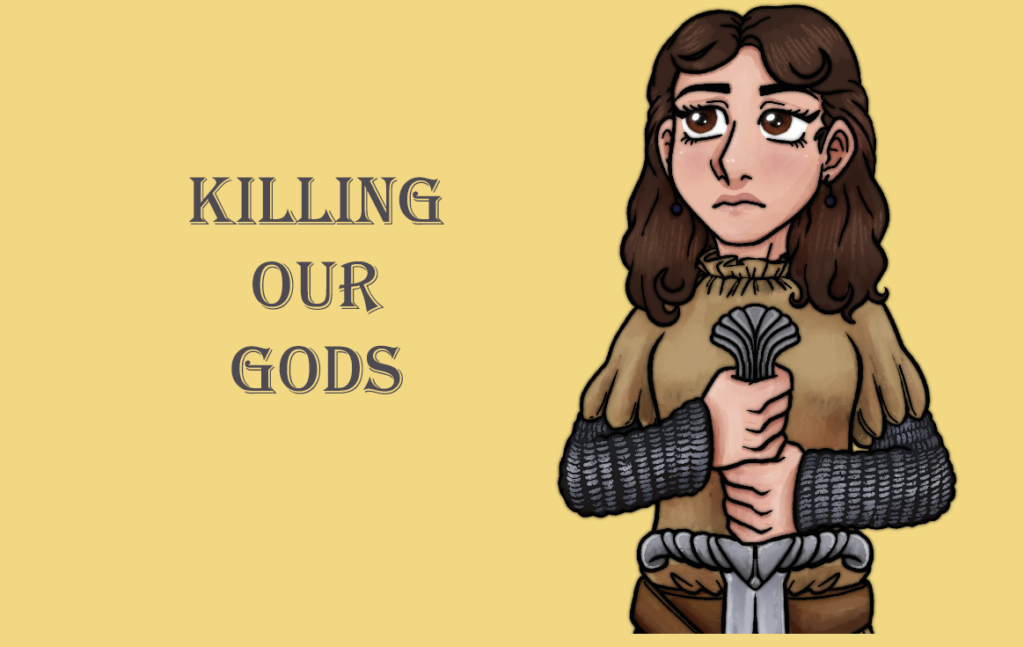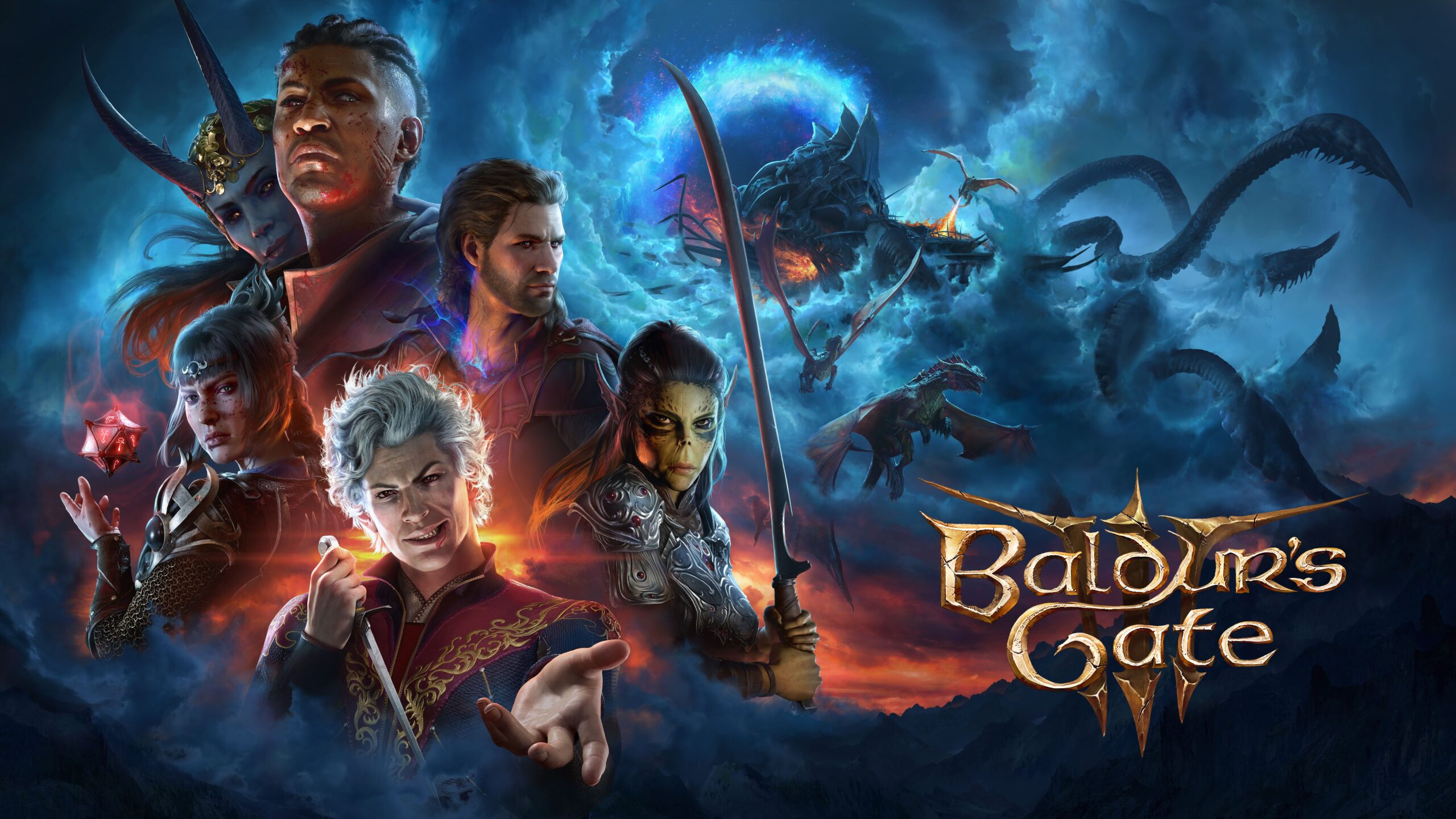
Street Idols: Diaries of a Spaceport Janitor and Mundane Faith
Killing Our Gods is a monthly column from Grace Benfell about Christianity, religion, and role-playing through a queer, Marxist, and lapsed Mormon lens.
At night, the city barely quiets and its lights flicker through the windows, like distant stars. You are exhausted, but yet you linger, choosing to savor a moment without work, the stress of the day fading. To give yourself voice, you write in your diary and then kneel to pray. Life can be better, you hope, and lay down to dream of it.
Diaries of a Spaceport Janitor mocks video game structure. It places the player into an RPG hub town. You are surrounded by heroes who level up, get new weapons, and move through life with the privilege of a protagonist. You, meanwhile, pick up their trash. This is, in other words, a game that is very interested in the material. It tries to imagine what a spaceport like those in Phantasy Star Online or Destiny would actually entail and puts you in the place of the silent working class. While hunters, titans, and warlocks shop for gear, you haggle prices and wipe away their messes. Additionally, Diaries is about economics, trading, and pricing in a way that traditional RPGs can’t quite be. Your janitor picks up pieces of trash and either incinerates them or keeps them. For each item you incinerate, you get guaranteed cash, but others might value what you would just throw away. There are hundreds of vendors, both obvious and secret, who might want exactly what you just picked up.

There are lots of games that rely on exchanging goods to get a profit. However, you are not desperate for food or medicine in most of those games. In Diaries, you will go hungry and get sick without a steady source of food. The regular care of life is in addition to the meta goal: to free yourself of a curse. It’s a skull that floats around you, a literal manifestation of the pressure of poverty. You can only free yourself by completing odd jobs for the citizens of the spaceport. Because of this, Diaries asks you to stretch your resources, to know what shops want what items, what areas you will find them in, and to move quickly. Much of the game’s challenge is learning its map, understanding its alleyways and roads to maximize the money you make each day.
However, it isn’t so tidy. You cannot rise above your station in Diaries, even though the limits of the systems and unintended exploits might allow you to grow wealthy. All you can hope for is that you might be rid of the curse that haunts you. You cannot “earn” your way out of poverty. It’s quite easy to get lost or forget what shop had the best price–the shops aren’t given names. There is no map, mini or otherwise. All of the game’s economics end up feeling like mood setting or back drop. Additionally, in a strange move for a video game, it asks you to write, to mark down what was real to you. Its titular diary only grants a little space, but still asks you to stain a blank page. Furthermore, the game’s opening screen has you choose a goddess to whom you are devoted. Their idol will be in your one room apartment, above your lowly computer. It’s a simple choice, but the game expands its significance as you explore. Statues and markers of every goddess can be found throughout the spaceport, and you can pray to them or leave candles. This leads to a game that creates a vibrant spiritual life for its protagonist, expressed through a player’s subjectivity. What is this doing in a game about economic survival?

The short answer is that the spiritual and the material are deeply connected. The material conditions of the world are in part, made by our faith in a different world, whether that be this one or an afterlife. Marx wrote about religion as both an expression and defense of economic oppression: “Religion is the sigh of the oppressed creature, the heart of a heartless world, and the soul of soulless conditions. It is the opium of the people. The abolition of religion as the illusory happiness of the people is the demand for their real happiness.” In short, religion is a painkiller. It does not prevent the cause of hurt, nor does it heal, but it eases pain, adjusts you to what will one day kill you. Marx, though, does not demand so much that faith be abandoned, but rather that it be redirected. Rather than a painkiller, you can give the cure: revolution, a new world, and with it, real happiness.
Diaries echoes this sentiment in some key ways. The one character stat in it is Luck. The game leaves what it actually does to the imagination. It could mean better items, less encounters with the police, more time in the day to gather items. It is what you “get” from praying to the gods. But of course, its ambiguity means that you don’t know if it does anything. What it certainly does not do is free you from the oppression of your work or the watchful eye of the cops. You can even see your luck under your chosen God’s idol, from the same platform from which you collect your wages. It could be just a false hope, meant to placate you until the day you die.
Marx, though, was writing about organized Christianity, a framework that Diaries actively pushes against. Rather than the singular, but really triangular, masculine God, there is a plurality of feminine divines. There are no churches or cathedrals, no grand displays of power from the church, but rather idols on street corners and around trees. There is no church to take your money or your labor, no easy way the goddesses structure your life. Just like the diary, the game leaves meaning open, lets you reject the gods or follow them. Luck, after all, never saved anyone. But your belief in yourself, in your ability to survive, just might.

What Marx feared about faith was its ability to defang anger, to push off daring for a better life to some unsung date, while workers died under their bosses’ feet. It is a justified fear. Faith can numb us to the reality of the world. It numbed me to believe that some day all would be made right, that queer people would be brought justice if I just waited. But it can also push us into the mess of the world. It can put fire in our bellies, push us to believe that something can change. I can change it. Even Christ, in his human contradiction, emphasizes this. Both “your burden will be made light” and “I come not to bring peace, but a sword.” There is no far flung day for the work. It has to happen now.
Faith will continue to move and make in the world. It is up to us if we use it to move towards a different, better world or if we use it to maintain the contradictions of this broken one. It is a broader concept than any one God or even any God at all. More than anything else, Diaries of a Spaceport Janitor reminds me of this. Throughout the multicolored streets, different beliefs and truths, there is a whisper from the many shrines, from each quiet footstep you take: You are still your own. You still have power. There is no revolution here, not yet, but fuel is all around, waiting for the fire of faith.





